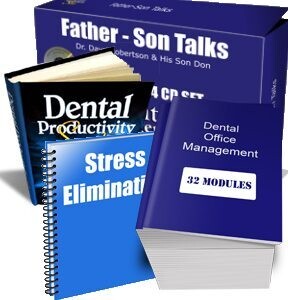Revenue Up, Costs Down; Is it Possible?
Please read this if real dental practice bottom line improvement is of interest to you.
The nice thing about what I write is it is not theory. It is based on actual results from my office, which is very likely not much different from your office other than the size. If it works for me it will work for you too.
I just had a look at my financial statement for last year.
It’s no secret that we are in a recession and holding steady would be considered a win.
So 2 things jumped off the page when I looked at my year end numbers.
First; revenues were up 10 %. This is hard to achieve for anyone. It is harder yet when an office is already 10 times the size of a typical office. And even harder when we are in a recession.
So I was very pleased to see that. It was gratifying, but not a total surprise, since we work on the growth of the practice all the time.
But the second thing I noticed really caught me by surprise. My staff salaries were down from the prior year. And I don’t mean down percentage wise although that was also true. I actually spent less on salaries last year than the year before. By $70,000! This has never, ever happened in my practice in 31 years. And especially with a big jump in production.
We did not have any salary freezes or cutbacks. No one’s salary was reduced. In fact we instituted many raises on an individual basis where we felt it was merited.
Now, just to be more clear, cutting costs in a dental office is extremely difficult. You can’t cut rent, you can’t cut lab, cutting marketing is suicide and with supplies, it costs you more to pay your assistant to find good deals that you usually save. Our largest expense by far is salaries. And staff salaries seem to grow and grow as you give raises and add more staff.
I should also point out that we did not have a goal of reducing staff costs. It just happened.
So how did it happen?
I had to think about it, but there is no doubt as to exactly what happened.
It is our new software program.
It is not a program that replaces your existing dental software package. It does a number of things that your current software does not do. It doesn’t just track your office numbers; it literally manages your office for you.
Earlier this year I sent an announcement about new software that we are using. It was simply to help us get a grasp on the many moving parts involved in managing our practice. We developed it over the past 3 years and we held a webinar demonstrating how it works.
It is a program that automates the management functions of a dental practice. It was really designed to save time by eliminating repetitive chores such as payroll entry, scheduling staff, staff shift changes, reporting, etc. These are usually done either by you or your office manager. Either way, your most qualified and highly paid staff.
By automating all of that it has freed up my office manager’s time incredibly. Now he not only manages 60 staff, he assists me with consulting and works at implementing our new software in other offices. So we knew it saved time; days and days of time.
Then somewhat to our surprise, we have found that the program catches inefficiencies we had no way of finding in the past.
We did expect the program to help increase production, but the salary savings were an expected but huge benefit. After all, cost savings go 100% to the bottom line, while growth often costs money; sometimes even more than the increase especially if you invested heavily in marketing.
Here are some examples of how it works.
In the past it was impossible to verify hours. For example if someone started an hour early because the dentist came in an hour early it is legit. If they come in an hour early to ‘set-up’, then it may be a case of someone increasing their hours without us needing them to do that.
Same is true of overtime. If the dentist takes an emergency and stays late, no problem. Just staying late and putting in more hours may not be okay.
In the past, we never saw these numbers till payroll day and by then it was impossible to verify who worked when or why.
But the program has rules that prevent these discretionary increases in hours. The payroll entry area knows your hours scheduled. If you add hours, you need to add a note to state the reason why. We can look at these on payroll day, but the reality is that 90% of them just went away.
For example, the system sees your team booked 9-5. If you log in at 8, it asks why. Fair question, really.
And guess what? The program is the bad guy. You don’ t have to say no, the machine does.
The other feature that has increased production and decreased salaries is our hygiene reporting.
Since the program tracks payroll, it knows how much someone earns. Since the staff calendar and schedule is done on it, it knows how many hours someone works. Since it tracks production in the reporting section, we can correlate what someone earns in relation to their production.
We have always struggled to gain compliance in hygiene with our suggestions. How many offices have tried to encourage the hygienists to do more perio treatment, offer whitening, encourage fluroride, fill their own openings during their downtime, book off if their last patient cancels, etc, etc.
If your office is like ours they mostly revert back to their usual routine fairly quickly.
With our system we told the hygienists we expected a certain multiple of their earnings in production. This % may vary from place to place, but basically we expected them to produce 3 times their salary.
It was like magic. 80% of our hygienists were around $1500 per month below ‘budget’. After just one short meeting to implement it, they all reverted to approx $1500 per month over budget. It became their job to figure out how to do it. We did not make one suggestion. They knew what to do.
I don’t mind paying high salaries to hygienists. They are a key part of our practice and invaluable in so many ways. But I don’t think it is out of line for me to expect a full day’s work for that salary. And now we get it.
There are so many other features that have saved us time. One of my favourites is the shift swap function. Anyone can go online and post a shift if they want the day off. And anyone can go online, even from home to take that shift. Last week one of our assistants sat on the beach in Mexico and picked up a few extra shifts from her iPhone.
There is no time spent by the manager, or staff members going from one person to the next disrupting their work to beg someone to take their shift.
The program does so many things; I can’t list them all here. However, if you want more examples, go to this site and check it out:http://www.automatedmanager.com/
We now have a bunch of demos online of how it works.
This program is for people that want their practice to be more businesslike without requiring any more business knowledge.
You can even try it out for free if you are not sure it is for you. And it does not matter what dental software you have; it is on the” cloud”, available on line and most of its functions are totally independent of your other programs
All for now,
Dr. Dave
Of course, as always we still have many ways and means of building your dental practice at https://dentalmanagementsecrets.com/











